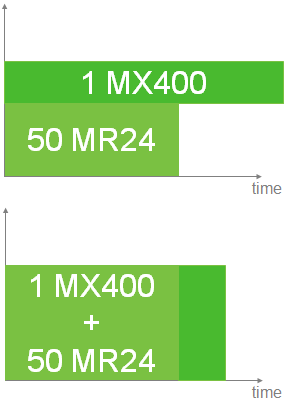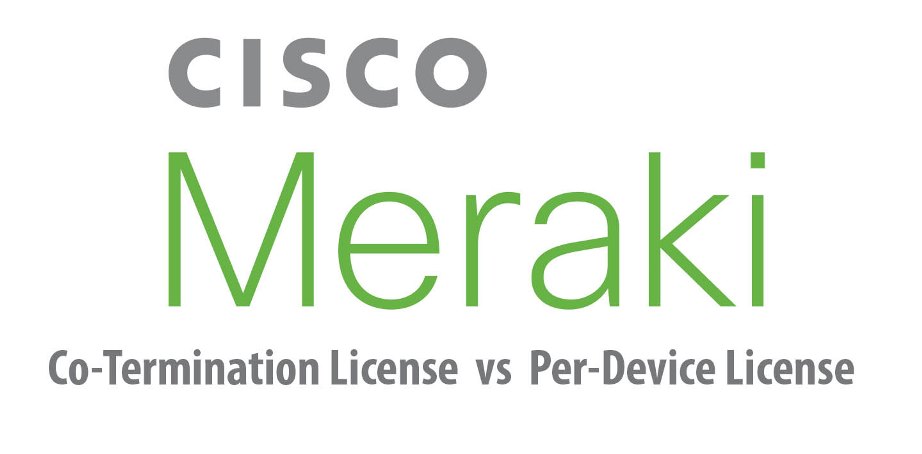Meraki Licensing Models offers two licensing models: a per-device licensing (PDL) model and a co-termination licensing model (co-term). All Meraki products can work with either per-device licensing or co-termination licensing type, Assign a license to a specific device (MR, MS, MX, MV, MG)
Meraki Licensing Models
Meraki currently offers two licensing models: a per-device licensing (PDL) model and a co-termination licensing model (co-term). There are essential differences between the two models when deciding which is best for you.
By default, all Meraki customers are currently using a co-term licensing model. Per-device licensing is available for all new and existing customers to opt in. If you are a new customer creating a new Meraki organization, you will automatically default to the co-term licensing model. If you wish to be on per-device licensing, you can opt-in via the Meraki dashboard after creating your organization.
Note: All Meraki products can work with either per-device licensing or co-termination licensing type.
Meraki Per-Device Licensing
Per-device licensing offers a variety of new features and enhanced flexibility for new and existing customers of all sizes:
- License devices individually: Assign a license to a specific device (MR, MS, MX, MV, MG) or a network (in the case of vMX and SM licenses) and maintain a shared expiration date or separate expiration dates across devices, networks, or organizations.
- Partial renewals: Enjoy the ability to renew all your devices or a subset of devices, as you prefer.
- Move licenses between organizations: Organizational admin (read/write) on multiple organizations can move a license (or licenses and devices together) between those organizations without calling into Meraki support. This functionality is available through the dashboard and APIs.
- 90-day license activation window: You will have up to 90 days to claim and assign your licenses before they activate, giving you more time to deploy Meraki products before your licenses burn time.
- APIs: APIs are available to claim, assign, and move licenses. This will allow a greater level of automation and the ability to integrate with other systems.
- Individual device shutdowns: If a license expires on a device, Meraki will only shut down that device or product after the 30-day grace period.
This licensing model is beneficial for coordinating licensing across different sites or organizations when those sites (and associated devices) are budgeted or accounted for differently. It can also be helpful when adding new hardware or expanding your Meraki infrastructure by intuitively rationalizing expiration dates for new and existing devices.
For more information and instructions on converting to this licensing model, refer to the Meraki Per-Device Licensing Overview documentation.Meraki Co-Term Licensing
Meraki co-term licensing is applied on an organization-wide basis, resulting in a single expiration date for every Meraki device managed in an organization. That date is dynamically calculated based on a weighted average of the license types purchased and claimed into your dashboard organization. This is accomplished by averaging all active licenses together and dividing them by the license limit or allowed count of Meraki devices in the organization. The single expiration date for all Meraki devices in that organization is dynamically recalculated (by the Meraki dashboard) with each license and hardware claim.

For example, suppose an organization had two separate Enterprise AP licenses, one license for 2x APs spanning one year (365 days) and another for 1x AP spanning five years (1,825 days). The co-termination value would be calculated as ((1825*1)+(365*2))/3= 851 days total for all three APs. So assuming all three licenses were applied on the same day, the organization would have a co-term date of 851 days from the start date of the licenses.
For more information, refer to the Meraki Co-Termination Licensing Overview document.
Licensing Model Similarities
- Customers are able to maintain a shared expiration date across all of their devices/products within an organization in both licensing models
- All Meraki core products function in both models. Some additional products (such as Meraki wireless with Umbrella) are only offered on the per-device licensing model
- Customers purchase licenses for both models in the same way (i.e. the same SKU)
- The price of licenses remains the same between the two models
- Customers receive a single license key and order number in each model
- MX devices must have organization-wide Advanced Security or Enterprise Security licensing in both licensing models
Licensing Model Differences
Per-device licensing | Co-termination licensing |
|---|---|
Maintain single or multiple separate expiration dates for devices in an organization. | Maintain a single expiration date for all devices in an organization. |
Devices maintain a unique, device-specific expiration date. | The expiration date is determined by weighing the amount of remaining time (value) across all licensed products in an organization. |
Only devices out of license compliance are deactivated. | The entire organization is deactivated for any license compliance issue. |
Upon license expiration, customers can renew licenses individually or en masse. | Upon license expiration, a customer must purchase a renewal license for all devices in an organization. |
Nonprofits Save 50% or More on Cisco Meraki Through Telecom4Good
By choosing the right Meraki license model for your organization, you can ensure that your network is running the way that works best for you. Whether you choose Per-Device Licensing or Co-Term, Meraki licenses are easy to take control of your network and keep it running smoothly. You can compare Meraki license pricing on our Shop Cisco Meraki page. Be sure to also check out our Cisco Meraki Nonprofit Discount Program. To learn more or discuss the available Cisco Meraki license option to fit your needs, please get in touch with meraki-support@telecom4good.org or schedule a call.

